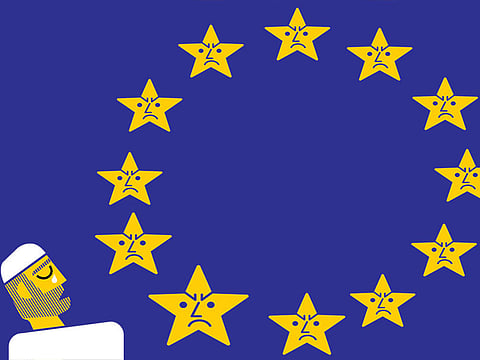Facing up to terror is a global challenge
An unpleasant rise to unnecessary suspicion among European citizens

Islam in Europe or “Islamisation” of Europe, as some currently call it, has, since the Charlie Hebdo massacre of last month in Paris, become an issue so hotly discussed that it is debated almost on every platform and panel discussion in the West. While in Berlin last week, I attended one of those panels, surprisingly organised within the framework of the 65th International Film Festival, Berlinale. The organisers rightly believed the killings in Paris have shaken the foundation of free thinking in Europe for the first time since the end of the Second Word War and are speedily making terror a global challenge. Such a discussion has become essential even within the context of cinema’s activities. The carefully worded invitation to attend the panel correctly summarised the overall concern in Europe and the importance of how to handle such a highly sensitive issue: ‘Not only about Cinema/Accepting the Challenge — How to deal with Fundamentalism, Tolerance and Freedom of Expression’, the invitation read.
With its colossal, hateful Nazi past, Germany stands out among European countries in demonstrating its resolve to face up, in modern times, to the hidden threats to the country’s social fabric and stability, in view of the rapid rise of right wing sentiments in the aftermath of the Paris events. In fact, such sentiments have already been widely in play in many European capitals and cities long before the atrocities in Paris. Other European countries, such as Holland and Belgium in addition to France and Germany, are periodically subjected to heinous racist attacks. Nordic countries, including Sweden and Norway, have recently been in the news for their unfortunate murderous incidents based purely on race.
Attacks against non-whites and communities of Arab and Muslim origins, are not limited to new comers to these countries, but also directed against old immigrants who have settled in their new homes for decades. When talking to some of these immigrants in Berlin one keeps hearing stories of life-threatening messages transmitted to their children’s mobiles at schools or themselves at their places of work. ‘The only good Muslim is a dead Muslim’, one of the mobile messages reads. Unfortunately, this is to be expected as Germany has become the world’s second-most sought-after immigrant destination after the US. Undoubtedly, the social structure and cohesion of large number of European countries, including Germany of course, are now constantly tested. The anti-immigration Islamophobic protest last December, in the former East German city of Dresden, which has the least number of immigrants in the country, is a dangerous omen of things to come. Organised by Pegida, short in German for ‘Patriotic Europeans against the Islamisation of the West’, the campaign is being launched on behalf the whole of West and not only Europe or Germany on its own.
Pegida managed to rope in about 25,000 protesters to the streets of Dresden, but German mainstream political parties mobilised 35,000 people who rallied against Pegida to show support for tolerance and multiculturalism. In her New Year address to the nation, German Chancellor Angela Merkel urged Germans to shun Pegida. “Do not follow people who organise these rallies, for their hearts are cold and often full of prejudice and even hate,” she said. Prominent politicians and celebrities signed petition of ‘NO’ to xenophobia and ‘YES’ to diversity and tolerance in the country’s biggest-selling daily, Bild, to protest against Pegida. Signatories included former chancellor Helmut Schmidt and retired football star Oliver Beirhoff.
Since the demise of Nazism, German politicians have, by and large, been amongst the most vocal in Europe in support of tolerance and diversity when it comes to immigrants. But the rise of violence and terrorist attacks by Islamists and some returnee terrorists have readily provided racist organisations and individuals in Europe enough reasons to viciously turn against immigrants. This has been the situation long before Pegida’s emergence and of course before the horrible killings in Paris. Some of the most recent studies in Europe suggest that about 57 per cent of non-Muslim Germans consider Islam as a threat.
In 2014, Germany’s share of immigrants to Europe was the largest with 180,000 asylum seekers compared with 127,000 in 2013. Germany’s ethnic Turkish community on its own is the largest immigrant group with more than three million and of course the large majority are Muslims. However, many have lived in Germany for generations and have progressively made strides and are well integrated in the society. But the new arrivals from Syria and Iraq add huge numbers to the existing immigrants and asylum seekers. It is also well-known that Chechens and Afghan immigrants have sought refuge in Germany. According to the European Commission, there were 435,760 asylum claims in the European Union in 2013 — a 30 per cent rise on 2012 — and at the end of 2013, there were more than 352,000 applicants awaiting a decision on their asylum status. Again, Germany had the highest number of asylum claims, a quarter of the total of which were recent immigrants from war-torn Syria. However, one element in the overall debate about the new demographic formations in the major European countries is missing. The voice of the ethnic minorities in these countries over the issue of violence and extremism in their new home, is not yet widely heard and this gives unpleasant rise to unnecessary suspicion among Europeans.
Mustapha Karkouti is a former president of the Foreign Press Association, London.
Sign up for the Daily Briefing
Get the latest news and updates straight to your inbox


